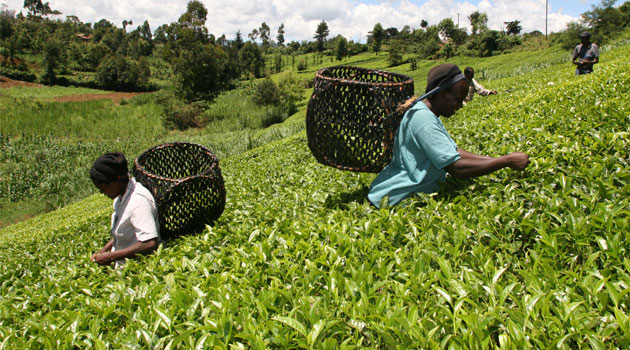
During the Industrial Court ruling on June 20, this year, the tea growers were ordered to raise the workers’ wages by 15 percent for the year 2014 and 2015 among other increases despite a demand of 25 percent/FILE
NAIROBI, Kenya, Aug 9 – The continued demand for annual wage increase by tea workers poses a threat to the sector in the long term, according to the Kenya Tea Growers Association (KTGA).
Citing the recent strike by tea workers, CEO Apollo Kiarii says the trend cannot be sustained as tea prices are not going up as expected hence increasing the cost of production.
At the moment he explains, the total cost of production per kilo is $1.9 while the prices at the Mombasa Tea Auction are around $2.1 a kilo.
Speaking to Capital FM Business, Kiarii said there is need for continued sober negotiations between the workers and the growers among other stakeholders to come up with reasonable plan on how to manage the wage issue as more pressure will hurt the sector.
“If this wage issue is not sustained that means that us in the industry we will not be able to employ the numbers we have. Our total cost, 60 percent is labour cost,” Kiarii said, “Now, if this continues going up we will now start thinking, what else can we do? Do we really need to grow tea? Or do we need to sell some of the land and put other crops or do housing estate?”
During the Industrial Court ruling on June 20, this year, the tea growers were ordered to raise the workers’ wages by 15 percent for the year 2014 and 2015 among other increases despite a demand of 25 percent.
The workers under the Kenya Plantation and Agricultural Workers Union, also got an extra day per week, Sh30,000 pay for anyone who leaves employment, Sh30,000 for funeral cost for any worker or close relative, 6 percent increase on leave travel allowance among others.
The delay in implementing the court ruling by the producers, who are on large scale farming under KTGA, saw their workers down their tools, a move that led to loss of millions of shillings.
However with the intervention of the Labour Ministry on the return-to-work formula saw the latter given a 7 and 8 percent increase for 2014 and 2015 respectively.
“This is the maximum we can manage. Not beyond. We have pursued court way but as we gone we will still encourage more talks,” he added, ” We are glad the government has been very supportive.”
Large scale tea farming accounts for 40 percent of total tea production in the country, while the rest, 60 percent is under the small scale farmers who sell the tea to the Kenya Tea Development Agency (KTDA).
The large scale growers argue that if their workers continue to demand annual pay rise, the small scale farmers will also demand the same, leaving the farmer with no profits.
“You know most of these workers live in the same areas. If I increase my worker salary, the other will go and demand Sh14 per kilo, yet KTDA is paying the farmer the same amount. What does that mean? the small farmer will have to source money from somewhere else. That is even more tough.”
Over the last 10 years, he says, tea prices have come down by 40 percent with the current prices at the Mombasa auctions showing less improvement.


































